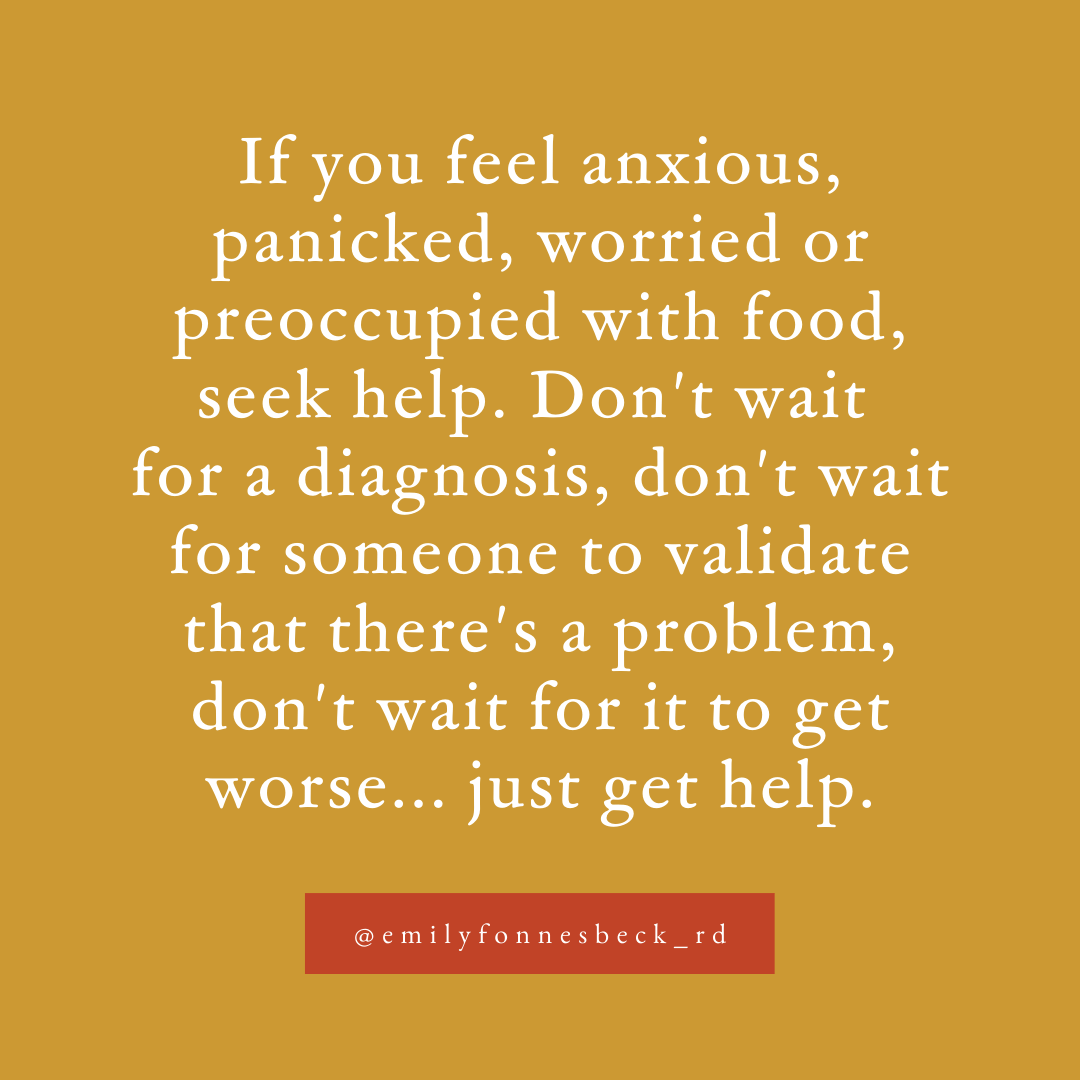This is the 5th article in my Eating Disorder Recovery Q&A blog series! In case you missed the first 4, I’ll link them below:
Eating disorder recovery Q&A: How do I stay hopeful in recovery? Is full recovery even possible? Eating disorder recovery Q&A: How do I stay committed to recovery? What do I do when I’m triggered? Eating disorder recovery Q&A: Intuitive Eating in postpartum and for digestion concerns Eating disorder recovery Q&A: recovering from diet culture, and building a healthy relationship with exercise
These next 2 questions are an interesting combination. One is a child wanting support from their parents in recovery, and another is from a mother who’s daughter doesn’t want help. Let’s dive in!
Question 1: “How do you navigate recovery when your parents aren’t supportive of you getting help?”
This is so tricky and hard. I validate all the emotions that may come up as you try to navigate recovery without their support.
First, I’m so proud of you for recognizing that you do need help. Ultimately the one who needs to want to recover is YOU, so while it may not feel like it, you have all the validation and motivation you need for recovery.
At the same time, it’s so hard to recover without support, so here are some resources that may help:
- NEDA helpline. They will be able to help you locate resources in your area, provide support and give you treatment options.
- Also, definitely check out their free and low cost support page for information about groups, forums and apps you can use in recovery. https://www.nationaleatingdisorders.org/free-low-cost-support
- There are great ED recovery podcasts like The Eating Disorder Recovery Podcast and Navigating Recovery Podcast.
- You can also find daily inspiration on Instagram from ED therapists and dietitians. Just make sure to be following those with a non-diet and weight-inclusive approach.
Lastly, is it possible for you to bring it up with them again? Share articles or resources about eating disorders that helps them make a more informed decision? I’d definitely encourage you to continue an open dialogue with your parents about your eating disorder.

Question 2: “How do I help my daughter who doesn’t want help? She refuses to see a therapist.”
Different circumstances would warrant different interventions. The age of the child and the severity of the issue would definitely factor into what next steps to take. It would be a good idea for you to see an eating disorder therapist and/or dietitian yourself to talk about your daughter’s situation, get advice for how to support her, and seek guidance on what level of care they’d recommend. They may even have resources for family based therapy, or just be able to provide support and guidance for you as you care for your child.
But, speaking generally, here are some ways to approach the situation:
- Remind your child that people trained to help those with eating disorders can provide unique treatment strategies based on her circumstances. They will meet her where she’s at. This can be an opportunity for her to seek help with whatever concerns or issues she faces with food and body image. Therapists and dietitians would ideally use a client centered approach and not make anyone do something they aren’t ready for.
- Remember that eating disorders are about food, and also totally not about food at all. There are underlying fears, belief systems and issues that need to be addressed. Like the tip of an iceberg, you’re only seeing how those issues manifest in behaviors (how they are coping). Beneath the surface is another massive block of ice outside of view. It’s tempting to want to only deal with what’s in view, but it’s so important to recognize that there is a lot you aren’t seeing which is fueling the eating disorder. That’s what needs to be addressed, and they need a safe place to do it.
- As such, try to create a non-judgmental and approachable relationship where they feel able to share how they feel and what they are experiencing without worrying you will try to jump in and “fix” it. Give them space to just talk. Telling them you care about them and want to know how they are doing is the most effective way to show support.
- Control what you can control, and avoid getting into arguments or debates about food or recovery. For example, model healthy behaviors instead of arguing about what your child might be doing “wrong”.
- Avoid showing frustration or annoyance with eating habits, and don’t try to force them to do something different. Feel free to show concern or even offer examples of more reasonable/adequate/balanced eating patterns.
- Use “I” statements like “I’m worried about you” vs “you are making everyone worried”. Essentially, you’ll want to avoid trying to guilt them into recovery.
- Remind yourself that they don’t want to recover YET. Even though they are resistant right now doesn’t mean they won’t be willing in the future.
I hope this has been helpful! If you have any questions you’d like me to answer in upcoming eating disorder recovery Q&As, feel free to leave a comment! Stay tuned for more to come.
